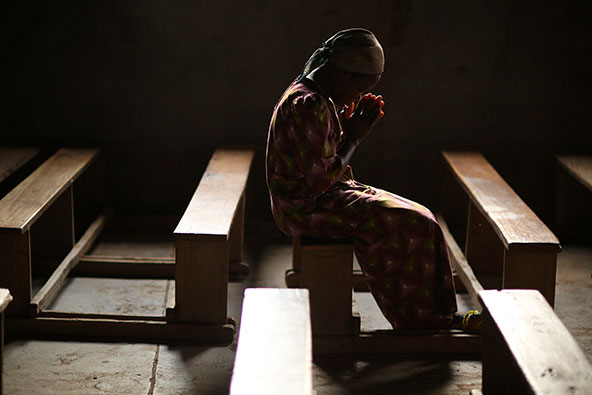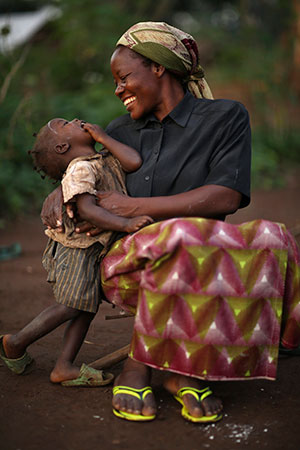

WASHINGTON (CNS) — “It is not my work only. It is the Lord’s.”
Such was the summation of Sister Angelique Namaika, a member of the Augustine Sisters of Dungu and Doruma, as she spoke to reporters in an international conference call upon winning the Nansen Refugee Award bestowed annually by the U.N. High Commissioner for Refugees.
Sister Angelique has been working for the past four years with women forced to leave their homes in the northeastern Congolese bush because of the ongoing civil strife in the Congo.
Many of the women have been forced to marry members of the Lord’s Resistance Army, a rebel group led by Joseph Kony, whose activities have destabilized not only Congo but disrupted life in neighboring African nations as well. Last year, she testified to Congress and the U.N. Security Council about LRA-caused instability in the region.
Speaking through an interpreter during the Sept. 12 conference call, Sister Angelique said, “When I arrived here in Congo in 2003, I started helping women who didn’t have a chance to go to school. So when the displaced women came in 2009, I greeted them in the communities where I was doing training — Because I saw that these women were vulnerable, even more vulnerable than the other women I was helping, because these women were traumatized, and they didn’t have a chance.”
“Since they were living so far away from the center,” she continued, “I moved my training and teaching activities to the center where they (the displaced women) were living.”
She estimated she has helped 2,000 women in her ministry in Congo, including those she helped prior to her work with displaced women. Currently, she is helping 150 women “because this is what I can do with the means I have.”
The Nansen Award, officially announced Sept. 17, comes with a cash prize ($100,000) donated by the winner to a charity of his or her choice. The award was to be presented in a ceremony in Geneva Sept. 30. Afterward, Sister Angelique was scheduled to go to the Vatican to meet with Pope Francis Oct. 2.
The nun was herself among the internally displaced in 2009 as a result of LRA violence.
Sister Angelique detailed one success story of the many women she has helped.
The girl had been kidnapped at age 14, held by the LRA for a year and a half and impregnated. She escaped and, with no skills, was reduced to trying to sell charcoal in the street. When Sister Angelique was told of the teen’s presence, “I directly went to listen to her story. So I found her and I saw that her kid was malnourished,” she recalled.
“The girl, the mother of that baby, also needed help because she had a sexually transmitted disease. I helped them first with food and I took her to the hospital for her to get some medical care. And then I thought if I continue to help with only food and don’t teach her how to find herself food, it’s not going to work,” Sister Angelique said.
“I taught her how to bake bread, so after a few days she was already baking her own bread and selling her bread in the center. I also taught her how to sew. I taught her sewing. But one thing also, one problem she had was she was rejected by her mom. Her mom said it was her fault that she was caught by the LRA. So the girl came back to me again and left the baby with me and (went) back to the bush.”
Sister Angelique convinced the teen to stay with her for a month.

“I gave her advice, then I went to her mom’s house to do mediation. So the two of them, the mom and the girl, they reconciled and today they are on good terms,” she said. “The girl is happy because she felt love, and the good news is today’s she’s married and has a second child. Her work as a baker of bread brings her a good income and you can see that she’s happy.”
Her suggestions to restore peace in the region begin with “the grace of conversion to Joseph Kony … so that he just stops his atrocities and leaves the bush. And if this happens, women will feel safe to go back home and it will be better. It will also help with their trauma.
“What is important is to help women who have suffered and have been traumatized,” she said. “It is the women who are raising the kids, so it is important for them to be able to go back.”
— By Mark Pattison, Catholic News Service





